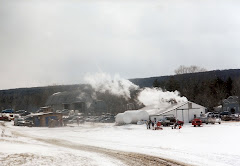Here's a press release about an upcoming event at the Roger Tory Peterson Institute.
The Uncommon Crow: A Hidden Life" lecture with Kevin McGowan
Saturday, February 13, 2010 at the Roger Tory Peterson Institute
Program at 7:00
An informal reception for Kevin will begin at 6 PM.
You've seen them in your yard. You've heard them in the trees. Now here's a chance to learn a little more about one of the most conspicuous year-round residents of Western New York, the American Crow.
You're invited to attend a free illustrated lecture called "The Uncommon Crow: A Hidden Life" with Cornell University ornithologist Kevin McGowan on Saturday, February 13th at 7 PM at the Peterson Institute.
Kevin, affiliated with both the Cornell Lab of Ornithology and The Department of Natural Resources, Cornell University, will talk about some of the fascinating but often overlooked aspects of crow life. Kevin has tracked hundreds of crows near and around Ithaca, New York by banding and wing tagging over two decades. His research has made him a world-renowned expert on crow behavior.
He will also briefly touch on his involvement as co-editor of The Second Atlas of Breeding Birds in New York State, published in December 2008 by Cornell University Press. The exhibit created from this book, entitled "Mapping the Birds of New York", is currently on view at the Institute, on loan from the New York State Museum in Albany, through February 28, 2010.
Kevin grew up in Ohio, receiving his Bachelor of Science and Master of Science degrees in zoology from Ohio State University, and a Ph.D. in biology from the University of South Florida for his work on the social development of young Florida Scrub-Jays. He came to Cornell University in 1988, and is an elected member of the American Ornithologists' Union.
For more information about Kevin McGowan and his research, please visit http://www.birds.cornell.edu/. The Roger Tory Peterson institute is located at 311 Curtis street, Jamestown http://www.rtpi.org/
Subscribe to:
Post Comments (Atom)











No comments:
Post a Comment